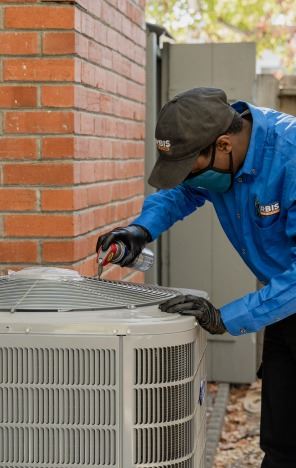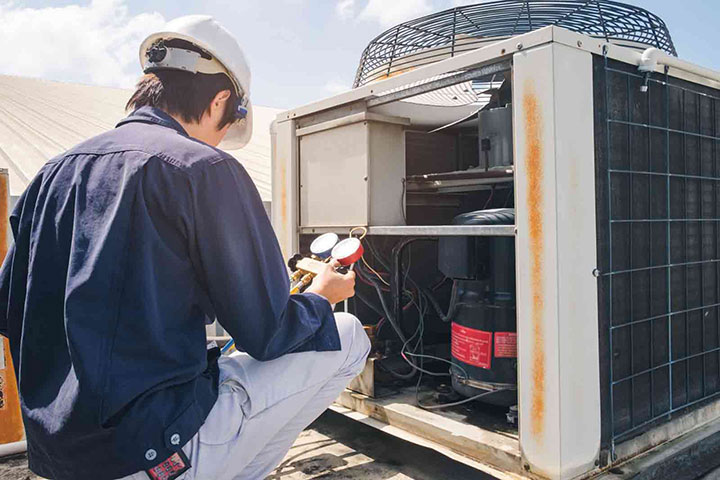Choosing In Between a Warm Pump and Heater: Key Considerations for Your Cooling And Heating Demands
When reviewing heating options for a/c needs, the decision in between a heatpump and a furnace can be complex. Each system offers distinct benefits tailored to certain climates and power efficiency goals. Understanding these differences is important for making an enlightened choice. Trick factors such as setup costs and ecological impact even more make complex the selection procedure. Which alternative absolutely straightens with one's comfort and sustainability preferences? The adhering to sections will certainly discover these considerations in detail.
Comprehending Heat Pumps: How They Function and Their Advantages
While lots of home owners consider various home heating choices, understanding exactly how warmth pumps function and their advantages can substantially affect their decision. Heatpump operate by moving warmth instead of generating it. In the winter season, they draw out warm from the outside air or ground and transfer it indoors, while in the summertime, they reverse this process, cooling down the home by eliminating warm outside. This double capability makes them flexible for year-round environment control.One of the primary benefits of heatpump is their energy effectiveness. They use substantially less electrical energy compared to standard home heating systems, potentially leading to reduced utility bills (ductless mini splits). Furthermore, heatpump have a smaller carbon footprint, making them an ecologically pleasant choice. They additionally require much less upkeep than traditional systems, adding to long-lasting price financial savings. On the whole, recognizing the auto mechanics and benefits of heat pumps can assist homeowners make informed choices regarding their home heating and cooling demands
Discovering Furnaces: Types, Procedure, and Advantages
Heaters are available in various types, consisting of gas, electrical, and oil designs, each with unique operational systems. Comprehending these differences is essential, as they impact efficiency and heating performance. Additionally, furnaces provide many advantages, such as regular warmth result and dependability in chillier climates.
Kinds of Heaters
Heating unit can differ significantly in design and operation, with furnaces being a prominent selection amongst home owners. There are a number of kinds of furnaces, each making use of different fuel resources and modern technologies. Gas heating systems are typical, leveraging gas to generate heat successfully. Electric heating systems, on the other hand, make use of electrical resistance to create warmth, frequently preferred for their straightforward installation. Oil heating systems, while less usual, are efficient in areas with minimal gas gain access to (heat pump service). Additionally, condensing heaters make the most of energy performance by catching and reusing exhaust gases. Each type operates with a system of warmth exchangers and ductwork to disperse cozy air throughout a home. Understanding the differences between these heating system kinds is vital for informed cooling and heating decisions
Advantages of Furnaces
For home owners seeking reputable heat during cold months, the advantages of heaters are significant. Heating systems provide constant home heating, ensuring even temperature levels throughout the home. They are specifically effective in severe cool, usually outshining heatpump in frigid problems. Various kinds, including gas, electric, and oil heating systems, offer versatility to satisfy varied demands and preferences.Furnaces also have a tendency to have reduced preliminary installment prices compared to warm pumps, making them a much more obtainable alternative for lots of. Their durable layout contributes to a longer lifespan, with numerous systems lasting over 15 years with appropriate upkeep. Additionally, modern-day heating systems are commonly furnished with sophisticated innovation for enhanced effectiveness, which can result in decreased energy bills. On the whole, heaters continue to be a reputable option for efficient home heating.

Power Performance: Comparing Warm Pumps and Furnaces
When contrasting energy performance between warm pumps and furnaces, the Seasonal Energy Performance Ratio (SEER) plays a vital duty in determining performance. Furthermore, an operational price evaluation reveals the long-term financial implications of each system. Understanding these elements can assist home owners in making educated choices concerning their home heating remedies.
Seasonal Energy Efficiency Proportion
Energy efficiency plays a necessary duty in the decision-making procedure in between warm pumps and heaters, particularly when considering the Seasonal Energy Effectiveness Ratio (SEER) This statistics actions the cooling efficiency of heatpump over an entire cooling season, supplying a standardized means to review efficiency. Higher SEER scores indicate higher power performance, translating to lower energy usage and minimized utility bills. In contrast, heating systems are usually assessed using the Annual Fuel Utilization Efficiency (AFUE) score, which mirrors heating efficiency. When comparing these two systems, home owners must focus on SEER ratings for heatpump, as they directly impact general power financial savings and ecological sustainability. A complete understanding of SEER can especially influence the long-lasting satisfaction and cost-effectiveness of the selected cooling and heating remedy.
Functional Price Evaluation
Recognizing the functional prices connected with heatpump and heating systems is crucial for property owners evaluating their options. Heatpump commonly supply higher energy effectiveness, transforming electric energy right into warmth with very little waste. This results in reduced month-to-month energy bills, especially in modest environments. On the other hand, typical heating systems, especially gas versions, might have reduced in advance expenses however can incur greater functional costs gradually because of sustain prices and performance ratings.Moreover, heat pumps can function as both heating and cooling systems, possibly lowering the requirement for separate heating and cooling units. While initial financial investments for warm pumps may be higher, their lasting cost savings in energy efficiency can make them a much more cost-effective choice for numerous families. Cautious evaluation of regional energy prices is important to identify the best option.
Setup Costs: What to Anticipate for Each Heater
Setup prices for furnace can vary considerably in between heatpump and furnaces, influencing homeowners' choices. Heat pumps normally have higher in advance installation prices, commonly varying from $3,500 to $8,000, depending on the system dimension and intricacy of installment. This consists of the exterior device, indoor handling system, and necessary ductwork adjustments. Conversely, furnaces have a tendency to have lower preliminary costs, balancing in between $2,500 and $6,000, which can be appealing for budget-conscious homeowners. Installation expenditures can boost if considerable ductwork is required.Moreover, the he has a good point option of gas kind for heating systems-- natural gas, propane, or electric-- can likewise influence setup costs. While warmth pumps supply power efficiency, their preliminary financial investment might hinder some buyers. Ultimately, reviewing setup costs along with long-term savings and effectiveness will certainly help property owners in making notified choices concerning their heater.
Environment Factors To Consider: Which System Executes Better in Your Area
Just how do environment conditions influence the effectiveness of heating systems? The efficiency of warmth pumps and heaters can vary significantly depending upon the regional climate. In modest climates, heat pumps excel by efficiently transferring heat from the outdoors air, making them an energy-saving alternative. Their efficiency lessens in incredibly cool temperatures, where they might struggle to remove sufficient warmth. Alternatively, heating systems, particularly gas versions, supply trustworthy and consistent warmth no matter outdoor problems, making them more effective in chillier regions.In areas that experience milder wintertimes, warm pumps can operate successfully year-round, giving both cooling and heating. In contrast, areas with harsh winters months usually gain from the robustness of furnaces. Eventually, comprehending the regional climate is necessary when making a decision in between a heatpump and a furnace, as it directly influences their functional efficiency and general efficiency.
Maintenance Requirements: Long-Term Take Care Of Heat Pumps vs. Furnaces
While both warmth pumps and heating systems call for normal maintenance to guarantee peak efficiency, their particular needs and treatment routines differ substantially. Heaters generally need much less frequent focus, with yearly assessments being adequate to look for gas leakages, tidy filters, and analyze overall performance. Their easier design frequently allows for simple repairs.In contrast, warm pumps require semiannual upkeep as a result of their double role in heating & cooling. This includes cleaning coils, inspecting refrigerant levels, and guaranteeing that both the outdoor and indoor devices work at their finest. Furthermore, heatpump maintenance often includes more complex components, making expert maintenance essential.Neglecting maintenance can result in lessened efficiency and boosted energy expenses for both systems. Inevitably, house owners must think about these long-term care demands when selecting in between a warmth pump and a heater, as positive maintenance can prolong the life-span and efficiency of either system considerably.
Environmental Effect: Picking a Sustainable Home Heating Alternative
The ecological influence of home heating systems is a critical assessment for house owners looking for sustainable options. Heatpump are generally a lot more energy-efficient than conventional furnaces, as they transfer heat instead than create it, greatly minimizing carbon exhausts. By making use of renewable resource resources, such as air-source or geothermal warm pumps, home owners can further reduce their ecological footprint.On the other hand, gas furnaces give off greenhouse gases and add to air contamination, though they frequently offer higher warmth result. Nonetheless, innovations in technology have led to the advancement of high-efficiency heating systems that minimize emissions.Ultimately, selecting a furnace entails evaluating efficiency versus ecological impact. House owners are motivated to review neighborhood energy resources and motivations for renewable systems, making certain a selection that straightens with both individual comfort and ecological responsibility. The decision influences not only instant convenience but likewise lasting sustainability and environmental wellness.
Frequently Asked Concerns
For How Long Do Warm Pumps and Furnaces Commonly Last?
The life expectancy of warm pumps typically varies from 15 to two decades, while heating systems can last in between 15 to three decades. Routine maintenance considerably affects their longevity and performance in supplying home heating remedies.
Can I Use a Warm Pump in Very Cold Climates?
Heatpump can run in extremely cold climates, but their efficiency decreases as temperatures drop. In such conditions, extra home heating resources might be needed to preserve comfortable indoor temperatures and guarantee peak performance.

What Is the Sound Level of Heat Pumps Versus Furnaces?
The noise levels of heatpump and heaters differ considerably. Generally, heat pumps operate more quietly than conventional heating systems, making them more effective for those conscious appear, while heaters may create louder functional noises why not try these out during home heating cycles.
Are Warmth Pumps Suitable for Both Cooling And Heating?
Warmth pumps are certainly suitable for both home heating and cooling (heat pump replacement ooltewah tn). They operate by transferring heat, offering efficient temperature control year-round, making them a flexible option for homeowners seeking an all-in-one HVAC option
What Size Furnace Do I Required for My Home?
Figuring out the proper size heating unit for a home needs examining factors such as square video footage, insulation quality, regional environment, this page and the home's design. Consulting an expert can ensure a precise analysis and excellent convenience. Heat pumps generally offer greater energy performance, converting electric energy right into warm with minimal waste. In modest climates, warmth pumps stand out by successfully transferring warmth from the outside air, making them an energy-saving alternative. On the other hand, furnaces, especially gas models, give reliable and regular warmth regardless of exterior conditions, making them better in chillier regions.In areas that experience milder winters months, warmth pumps can operate properly year-round, giving both heating and cooling. Warm pumps are normally much more energy-efficient than traditional furnaces, as they move warmth rather than create it, considerably minimizing carbon emissions. By using eco-friendly power resources, such as air-source or geothermal warmth pumps, homeowners can further reduce their eco-friendly footprint.On the various other hand, all-natural gas heating systems send out greenhouse gases and contribute to air pollution, though they typically offer higher warmth outcome.
Comments on “Is It Time for ductless mini splits? Expert Opinions”